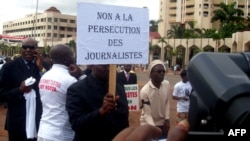As the coronavirus spreads to all corners of the African continent, advocacy groups are calling for the release of a particularly vulnerable group: jailed journalists.
In an open letter to 10 African heads of state, the Committee to Protect Journalists, or CPJ, and 80 other press freedom and human rights groups called for the media professionals to be freed.
"They are in jails that are overcrowded, where there are underlying health conditions where malaria and TB is a problem," said Angela Quintal, CPJ's Africa program coordinator. "So really, their lives are at risk here and many of them actually haven't even been convicted and have been sitting in detention for years without trial."
In a survey conducted at the end of 2019, CPJ found that at least 73 journalists were in prisons in Africa including 26 in Egypt, 16 in Eritrea and seven in Cameroon. Some of the Eritrean journalists have been imprisoned since 2001.
"When it comes to journalists who are being held there, not because they have committed a crime but are being held because of their journalism, it is necessary to ensure that these journalists are not stuck with what we call a death sentence," Quintal said. "Their freedom is really a matter of life and death."
One person who knows these difficulties is Mimi Mefo Takambou, a print and broadcast journalist from Cameroon. In 2018, she was arrested and charged with reporting false information and undermining state security for a story about an American missionary who was shot and killed in the West African country.
She was imprisoned for four days, and saw firsthand the squalid conditions in which journalists are held in the country and the lack of basic rights.
"The sanitation condition is not a very good one; like I said, the situation of overcrowding in prison. Access to the lawyer sometimes is problematic. We've had colleagues who are behind bars, and they'll have to spend several months even before having access to lawyers," she told VOA.
Takambou says she believes it is wrong for journalists to be held like this, not only on moral grounds, but also because they play a vital role in covering the coronavirus crisis.
"They have a huge role to play at this point in time in informing the population and giving them what they need as far as steps toward curbing the spread of coronavirus is concerned. But if most of these journalists are behind bars, who is going to tell the story?" she asked.
Takambou says she hopes her country and others that continue to imprison journalists will see information and those who report it as part of the solution to the coronavirus, not part of the problem.
"Release them so that they can be able to do their job," she said. "The place of the journalist is not in jail; the place of the journalist is in the field, telling the story, keeping people informed. And, at this point in time now, they are needed more than ever before."









